八年级英语现在完成时的用法
现在完成时的用法总结
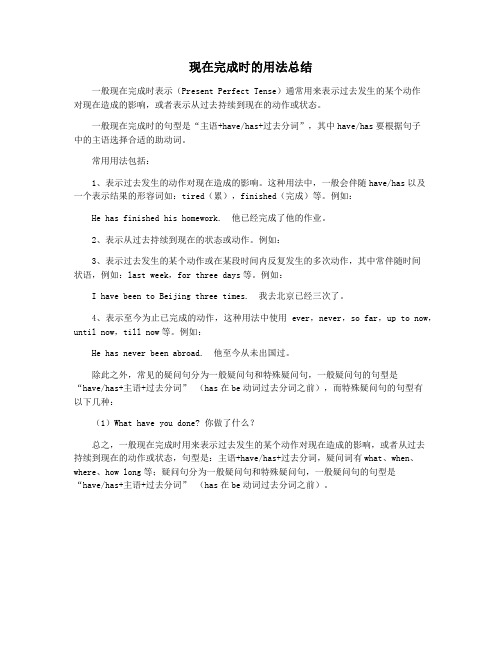
现在完成时的用法总结一般现在完成时表示(Present Perfect Tense)通常用来表示过去发生的某个动作对现在造成的影响,或者表示从过去持续到现在的动作或状态。
一般现在完成时的句型是“主语+have/has+过去分词”,其中have/has要根据句子中的主语选择合适的助动词。
常用用法包括:1、表示过去发生的动作对现在造成的影响。
这种用法中,一般会伴随have/has以及一个表示结果的形容词如:tired(累),finished(完成)等。
例如:He has finished his homework. 他已经完成了他的作业。
2、表示从过去持续到现在的状态或动作。
例如:3、表示过去发生的某个动作或在某段时间内反复发生的多次动作,其中常伴随时间状语,例如:last week,for three days等。
例如:I have been to Beijing three times. 我去北京已经三次了。
4、表示至今为止已完成的动作,这种用法中使用ever,never,so far,up to now,until now,till now等。
例如:He has never been abroad. 他至今从未出国过。
除此之外,常见的疑问句分为一般疑问句和特殊疑问句,一般疑问句的句型是“have/has+主语+过去分词” (has在be动词过去分词之前),而特殊疑问句的句型有以下几种:(1)What have you done? 你做了什么?总之,一般现在完成时用来表示过去发生的某个动作对现在造成的影响,或者从过去持续到现在的动作或状态,句型是:主语+have/has+过去分词,疑问词有what、when、where、how long等;疑问句分为一般疑问句和特殊疑问句,一般疑问句的句型是“have/has+主语+过去分词” (has在be动词过去分词之前)。
八年级英语语法:现在完成时的用法
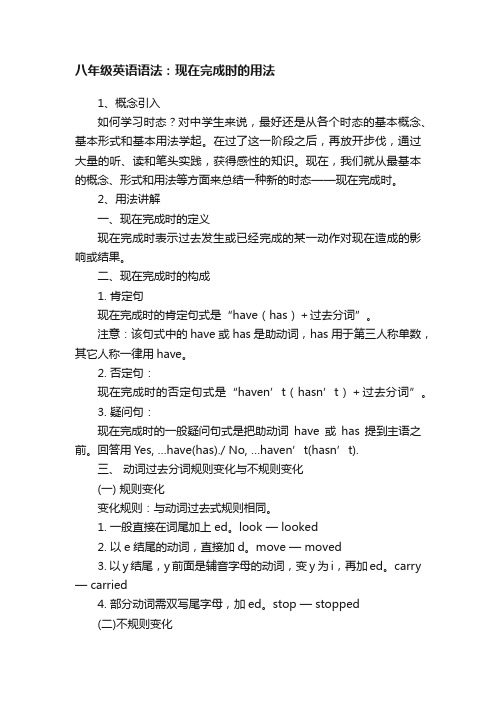
八年级英语语法:现在完成时的用法1、概念引入如何学习时态?对中学生来说,最好还是从各个时态的基本概念、基本形式和基本用法学起。
在过了这一阶段之后,再放开步伐,通过大量的听、读和笔头实践,获得感性的知识。
现在,我们就从最基本的概念、形式和用法等方面来总结一种新的时态——现在完成时。
2、用法讲解一、现在完成时的定义现在完成时表示过去发生或已经完成的某一动作对现在造成的影响或结果。
二、现在完成时的构成1. 肯定句现在完成时的肯定句式是“have(has)+过去分词”。
注意:该句式中的have或has是助动词,has用于第三人称单数,其它人称一律用have。
2. 否定句:现在完成时的否定句式是“haven’t(hasn’t)+过去分词”。
3. 疑问句:现在完成时的一般疑问句式是把助动词have或has提到主语之前。
回答用Yes, …have(has)./ No, …haven’t(hasn’t).三、动词过去分词规则变化与不规则变化(一) 规则变化变化规则:与动词过去式规则相同。
1. 一般直接在词尾加上ed。
look — looked2. 以e结尾的动词,直接加d。
move — moved3. 以y结尾,y前面是辅音字母的动词,变y 为i,再加ed。
carry — carried4. 部分动词需双写尾字母,加ed。
stop — stopped(二)不规则变化不规则动词的变化因词而异。
但是如果对不规则动词的过去式和过去分词做一分析,就可发现其中的“规则”。
同学们在记忆时,可按下面的形式对教材后不规则动词表进行分析、整理。
例如:AAB型原形过去式过去分词中文beat beat beaten 打败ABC 型原形过去式过去分词中文be was / were been 是,在…begin began begun 开始blow blew blown 吹break broke broken 破裂、折断AAA型原形过去式过去分词中文cost cost cost 花费cut cut cut 砍、切、割hit hit hit 打、撞ABA型原形过去式过去分词中文become became become 成为come came come 来ABB型原形过去式过去分词中文understand understood understood 理解、明白bring brought brought 带来build built built 建造burn burned/burnt burned/burnt 燃烧四、现在完成时的用法现在完成时表示过去某时发生的行为对主语目前产生的影响。
人教版八年级英语下册现在完成时讲解及练习
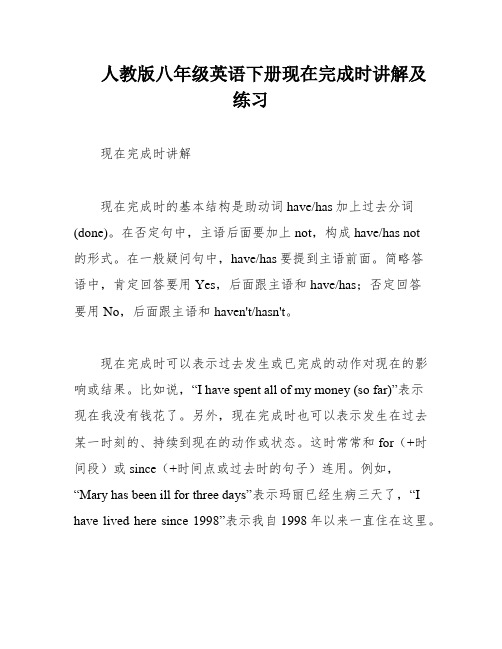
人教版八年级英语下册现在完成时讲解及练习现在完成时讲解现在完成时的基本结构是助动词have/has加上过去分词(done)。
在否定句中,主语后面要加上not,构成have/has not的形式。
在一般疑问句中,have/has要提到主语前面。
简略答语中,肯定回答要用Yes,后面跟主语和have/has;否定回答要用No,后面跟主语和haven't/hasn't。
现在完成时可以表示过去发生或已完成的动作对现在的影响或结果。
比如说,“I have spent all of my money (so far)”表示现在我没有钱花了。
另外,现在完成时也可以表示发生在过去某一时刻的、持续到现在的动作或状态。
这时常常和for(+时间段)或since(+时间点或过去时的句子)连用。
例如,“Mary has been ill for three days”表示玛丽已经生病三天了,“I have lived here since 1998”表示我自1998年以来一直住在这里。
现在完成时还有一些标志词,可以表达过去完成的动作对现在的影响。
这些标志词包括already、just和yet。
例如,“He has al ready got her help”表示他已经得到她的帮助,“He hasn't come back yet”表示他还没有回来。
This is the best film I have ever seen。
I have never seen a better movie before.He has never been to Beijing before。
He has never had the chance to visit Beijing.He says he has been to the USA three times already。
He has had the opportunity to visit the USA on three separate ns.So far。
英语现在完成时的用法总结
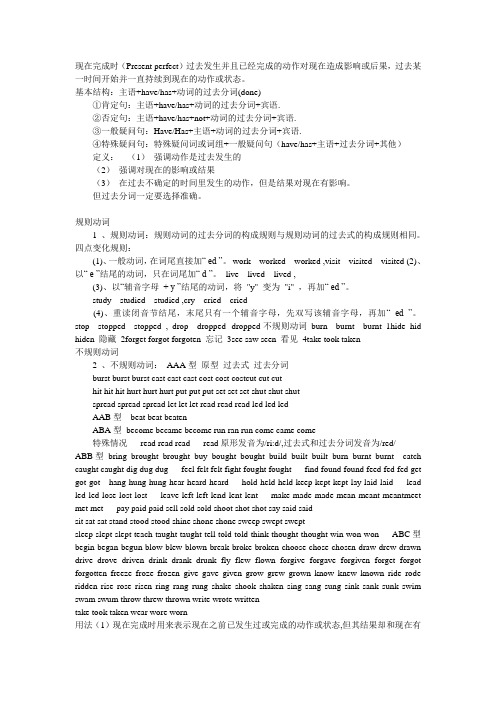
现在完成时(Present perfect)过去发生并且已经完成的动作对现在造成影响或后果,过去某一时间开始并一直持续到现在的动作或状态。
基本结构:主语+have/has+动词的过去分词(done)①肯定句:主语+have/has+动词的过去分词+宾语.②否定句:主语+have/has+not+动词的过去分词+宾语.③一般疑问句:Have/Has+主语+动词的过去分词+宾语.④特殊疑问句:特殊疑问词或词组+一般疑问句(have/has+主语+过去分词+其他)定义:(1)强调动作是过去发生的(2)强调对现在的影响或结果(3)在过去不确定的时间里发生的动作,但是结果对现在有影响。
但过去分词一定要选择准确。
规则动词1 、规则动词:规则动词的过去分词的构成规则与规则动词的过去式的构成规则相同。
四点变化规则:(1)、一般动词,在词尾直接加“ ed ”。
work---worked---worked ,visit---visited---visited (2)、以“ e ”结尾的动词,只在词尾加“ d ”。
live---lived---lived ,(3)、以“辅音字母+ y ”结尾的动词,将"y" 变为"i" ,再加“ ed ”。
study---studied---studied ,cry---cried---cried(4)、重读闭音节结尾,末尾只有一个辅音字母,先双写该辅音字母,再加“ ed ”。
stop---stopped---stopped , drop---dropped--dropped不规则动词burn---burnt---burnt 1hide hid hiden 隐藏2forget forgot forgoten 忘记3see saw seen 看见4take took taken不规则动词2 、不规则动词:AAA型原型过去式过去分词burst burst burst cast cast cast cost cost costcut cut cuthit hit hit hurt hurt hurt put put put set set set shut shut shutspread spread spread let let let read read read led led ledAAB型beat beat beatenABA型become became become run ran run come came come特殊情况read read read read原形发音为/ri:d/,过去式和过去分词发音为/red/ABB型bring brought brought buy bought bought build built built burn burnt burnt catch caught caught dig dug dug feel felt felt fight fought fought find found found feed fed fed get got got hang hung hung hear heard heard hold held held keep kept kept lay laid laid lead led led lose lost lost leave left left lend lent lent make made made mean meant meantmeet met met pay paid paid sell sold sold shoot shot shot say said saidsit sat sat stand stood stood shine shone shone sweep swept sweptsleep slept slept teach taught taught tell told told think thought thought win won won ABC型begin began begun blow blew blown break broke broken choose chose chosen draw drew drawn drive drove driven drink drank drunk fly flew flown forgive forgave forgiven forget forgot forgotten freeze froze frozen give gave given grow grew grown know knew known ride rode ridden rise rose risen ring rang rung shake shook shaken sing sang sung sink sank sunk swim swam swum throw threw thrown write wrote writtentake took taken wear wore worn用法(1)现在完成时用来表示现在之前已发生过或完成的动作或状态,但其结果却和现在有联系,也就是说,动作或状态发生在过去但它的影响现在还存在.I have spent all of my money.(含义是:现在我没有钱花了.)Jane has laid the table.(含义是:现在桌子已经摆好了.)Michael has been ill.(含义是:现在仍然很虚弱)He has returned from abroad. (含义是:现在已在此地)(2)现在完成时可以用来表示发生在过去某一时刻的,持续到现在的动作(用行为动词表示)或状态(be动词表示)常与for(+时间段),since(+时间点或过去时的句子)连用.①for+时段②since+过去一个时间点(译为:自从……以来)③since+时段+ago ④since+从句(过去时)●⑤It is+时段+since+从句(过去时)Mary has been ill for three days. I have lived here since 1998.●注:瞬间动词(buy,die,join,lose……)不能直接与for since 连用。
初二现在完成时全解
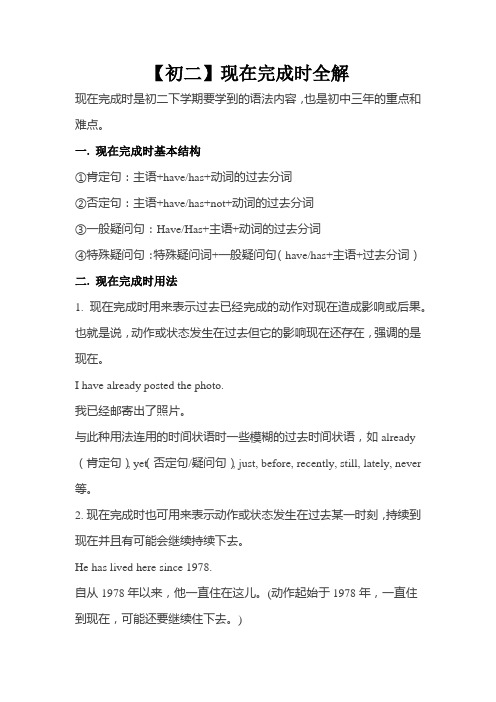
【初二】现在完成时全解现在完成时是初二下学期要学到的语法内容,也是初中三年的重点和难点。
一. 现在完成时基本结构①肯定句:主语+have/has+动词的过去分词②否定句:主语+have/has+not+动词的过去分词③一般疑问句:Have/Has+主语+动词的过去分词④特殊疑问句:特殊疑问词+一般疑问句(have/has+主语+过去分词)二. 现在完成时用法1. 现在完成时用来表示过去已经完成的动作对现在造成影响或后果。
也就是说,动作或状态发生在过去但它的影响现在还存在,强调的是现在。
I have already posted the photo.我已经邮寄出了照片。
与此种用法连用的时间状语时一些模糊的过去时间状语,如already (肯定句), yet(否定句/疑问句), just, before, recently, still, lately, never 等。
2. 现在完成时也可用来表示动作或状态发生在过去某一时刻,持续到现在并且有可能会继续持续下去。
He has lived here since 1978.自从1978年以来,他一直住在这儿。
(动作起始于1978年,一直住到现在,可能还要继续住下去。
)此种用法常与for(+时间段),since(+时间点或过去时的句子)连用。
谓语动词必须是延续性动词。
有些瞬间动词可变为延续动词:go out----be outfinish----be overopen----be opendie----be deadbuy---havefall ill---be illcome back----be backcatch a cold----have a cold三. 现在完成时常见考法对于现在完成时的考查,多以单选、句型转换或词语运用的形式考查学生在具体语境中灵活运用时态的能力。
在考试中,会让大家判断是否该用现在完成时,或者是考查“瞬间动词”不能与表示一段时间的状语连用”这一知识点。
八年级英语现在完成时知识点
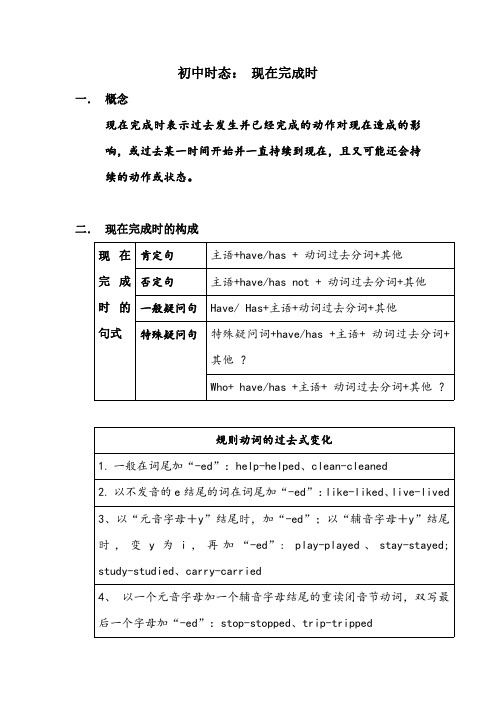
初中时态:现在完成时一.概念现在完成时表示过去发生并已经完成的动作对现在造成的影响,或过去某一时间开始并一直持续到现在,且又可能还会持续的动作或状态。
二.现在完成时的构成现在完成时的句式肯定句主语+have/has+动词过去分词+其他否定句主语+have/has not+动词过去分词+其他一般疑问句Have/Has+主语+动词过去分词+其他特殊疑问句特殊疑问词+have/has+主语+动词过去分词+其他?Who+have/has+主语+动词过去分词+其他?规则动词的过去式变化1.一般在词尾加“-ed”:help-helped、clean-cleaned2.以不发音的e结尾的词在词尾加“-ed”:like-liked、live-lived3、以“元音字母+y”结尾时,加“-ed”;以“辅音字母+y”结尾时,变y为i,再加“-ed”:play-played、stay-stayed; study-studied、carry-carried4、以一个元音字母加一个辅音字母结尾的重读闭音节动词,双写最后一个字母加“-ed”:stop-stopped、trip-tripped三.现在完成时的用法1.表示过去发生并已经完成的动作对现在造成的影响:I have heard of the man.2.过去某一时间开始并一直持续到现在,且又可能还会持续的动作或状态:I have lived in this city since I was born.四.常与一般现在时连用的时间状语already,yet(常用于否定句和疑问句中表示“仍,还”),before, recently,never,ever,once,twice等。
I have already finished my homework.固定的短语:for+一段时间,since+过去时间点+ago,so far, up to now,in the past/last three yearsI have been here since two months ago.五.难点拓展1.since和for的区别since用来说明动作的起始时间,for用来说明动作延续的时间长度。
初二英语现在完成时
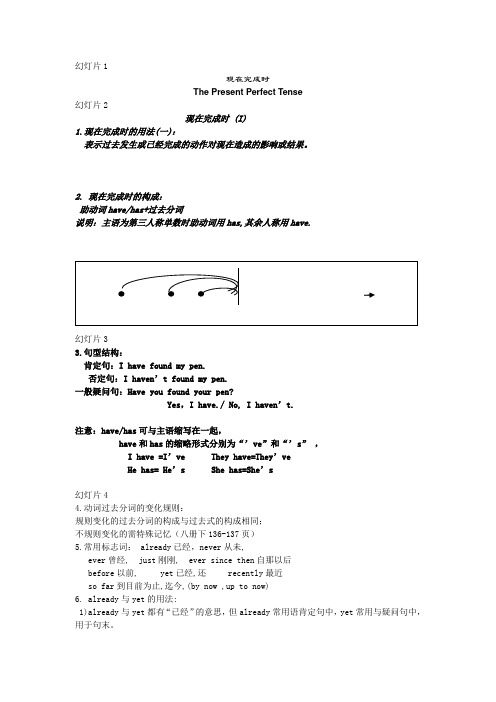
幻灯片1现在完成时The Present Perfect Tense幻灯片2现在完成时 (I)1.现在完成时的用法(一):表示过去发生或已经完成的动作对现在造成的影响或结果。
2. 现在完成时的构成:助动词have/has+过去分词说明:主语为第三人称单数时助动词用has,其余人称用have._______________ _ _ _ 幻灯片33.句型结构:肯定句:I have found my pen.否定句:I haven’t found my pen.一般疑问句:Have you found your pen?Yes,I have./ No, I haven’t.注意:have/has可与主语缩写在一起,have和has的缩略形式分别为“’ve”和“’s”,I have =I’ve They have=They’veHe has= He’s She has=She’s幻灯片44.动词过去分词的变化规则:规则变化的过去分词的构成与过去式的构成相同;不规则变化的需特殊记忆(八册下136-137页)5.常用标志词: already已经,never从未,ever曾经, just刚刚, ever since then自那以后before以前, yet已经,还 recently最近so far到目前为止,迄今,(by now ,up to now)6. already与yet的用法:1)already与yet都有“已经”的意思,但already常用语肯定句中,yet常用与疑问句中,用于句末。
I’ve already seen this film.我已经看过这部电影。
Have you seen the film yet?你已经看过这部电影了吗?幻灯片52) yet用于否定句中,意为“还(没);尚(未)”,置句末。
I haven’t seen the film yet.我还没看过这部电影。
3) already和yet的转换肯定句:I have already finished reading the book.变为否定句I haven’t finished reading the book yet.变为一般疑问句Have you finished reading the book yet?补充:already 还可用于特殊疑问句中:What books have you already read?幻灯片6现在完成时(II)现在完成时表示是否去过某地的用法:1.have/has been to 表示“曾经去过(某地)”,可以与never, ever, just, twice等副词连用I have been to a museum.Have you ever been to a museum?I have never been to a museum.He has been to the museum twice.2. have/has been to与have/has gone to的区别have/has been to 表示“曾经去过(某地)”have/has gone to 表示“已经去了(某地)”幻灯片73. 现在完成时和一般过去时的区别1)现在完成时表示过去发生的某一动作对现在造成的影响,强调的是现在的情况;而一般过去时表示过去发生的动作或存在的状态。
人教版英语八年级下册第八单元:现在完成时语法
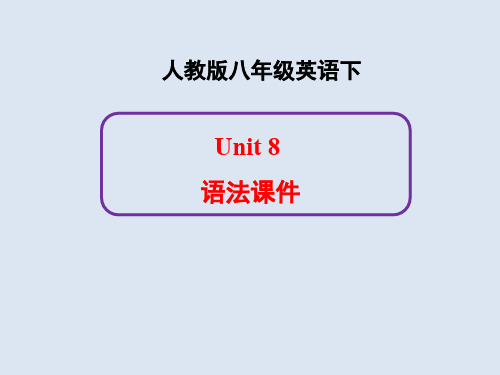
你已经读完这本书了么? yet 一般用于疑否句中,在句中意为“已经”;在否 定句中意为“还”通常放于句末。 如: Have you found the book yet ?
你已经找到那本书了么? Not yet . 还没找到。 She hasn’t finished her homework yet.
He _h_a_s_n_’_t __f_in_i_s_h_e_d__ his homework _y_e_t__. 3. Mum’s cooked the dinner. (改为否定句)
Mum _h_a_s_n_’t__ _c_o_o_k_e_d_ the dinner.
4.She joined the music club last week.( 改为现在完成时 ) She h_a_s_ _b_e_en__ _i_n___the music club __f_or__two weeks. 适当形式填空 5.He ____ha_s__le_ft____(leave ) the country and gone to India. 6.I have __be_e_n__(be )here for two months. 7.I’m waiting for my son . He __h_a_s_n’t__c_o_m_e_( not come )
---They have been here since 2008. Tom bought the car in 2009
---Tom have had the car since 2009.
语法加油站
一、句型转换。 1. I’ve already had dinner. (改为一般疑问句)
英语人教版八年级下册现在完成时
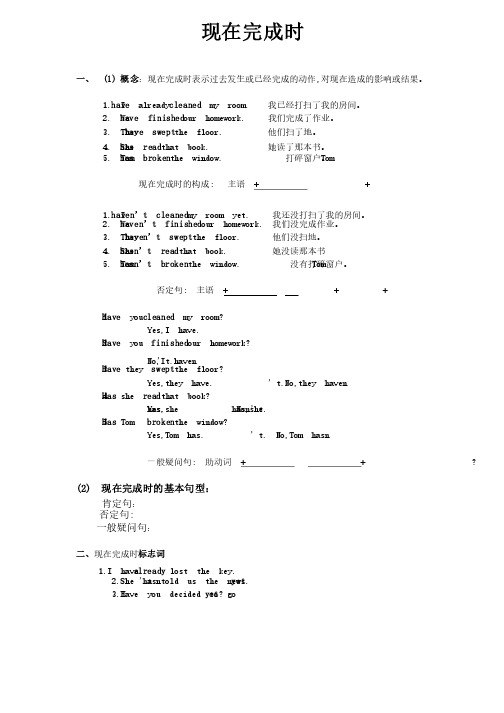
现在完成时一、 (1) 概念:现在完成时表示过去发生或已经完成的动作:现在完成时表示过去发生或已经完成的动作,,对现在造成的影响或结果。
对现在造成的影响或结果。
1. I have already c leaned cleaned my room. 我已经打扫了我的房间。
我已经打扫了我的房间。
2. We have finished our homework. 我们完成了作业。
我们完成了作业。
3. They have swept the floor. 他们扫了地。
他们扫了地。
4. She has read t hat book. that book. 她读了那本书。
她读了那本书。
5. Tom has broken the window. Tom 打碎窗户。
打碎窗户。
现在完成时的构成现在完成时的构成: : 主语主语 + + + +1. I haven haven’’t cleaned my room yet. 我还没打扫了我的房间。
我还没打扫了我的房间。
2. We haven haven’’t finished our homework. 我们没完成作业。
我们没完成作业。
3. They haven haven’’t swept t he floor. the floor. 他们没扫地。
他们没扫地。
4. She hasn hasn’’t read t hat book. that book. 她没读那本书她没读那本书5. Tom hasn hasn’’t broken t he window. Tom the window. Tom 没有打碎窗户。
没有打碎窗户。
否定句否定句: : 主语主语主语 + + + + + +1. Have you c leaned cleaned my room?Yes,I have.2. Have y ou you finishedour homework? No,I haven ’t. 3. Have they swept t he floor?the floor? Yes,they have. No,they haven ’t.4. Has she read t hat book?that book? Yes,she has. No,she hasn hasn’’t.5. Has Tom broken t he window?the window? Yes,Tom has. No,Tom hasn ’t.一般疑问句一般疑问句: : 助动词助动词助动词 + + ? + + ?(2) 现在完成时的基本句型:肯定句:肯定句:否定句否定句: : 一般疑问句:一般疑问句:二、现在完成时标志词1.I have already lost the key.2.She hasn ’t told us the news yet .3.Have you decided to go yet ?4.I have just cleaned my hands.5.John has never been to Nanjing6.Have you ever been to a museum?7.He has stayed here since 5 5 o o ’clock.David has lived here since 1992.8.He has has stayed stayed stayed here here since 5 5 hours hours hours ago. ago.His father has been in the Party since 10 years ago.9.She has taught English since he he came came came here. here.She has taught us since I came to this school.10.He has kept the book for 2 weeks.I have had this dictionary for t hree years.three years. Since: (自…以来)(1)(2)(3)for(长达)just (谓语动词之前谓语动词之前谓语动词之前) before() before(句末)句末) so far so far 到目前为止到目前为止in the past/last few years(过去几年来过去几年来) )练一练:练一练:选用选用 for for 和 since 填空填空: :1.We haven ’t seen each other ______ a long time.2.His father has been in the Party ______ 10 years ago.3.The film has been on ______ 20 minutes.4.Mr Green has worked here ______ he came to China.5.His grandparents have been dead ______ several years.6. It ’s five years _______ we met last time.1.The house is dirty. We _______it for weeks.A didn ’t cleanB hadn ’t cleanedC don ’t cleanD haven ’t cleaned2. ---Have you found your keys _______---Yes, I have _______ found them.A already; yetB yet;alreadyC already;alreadyD yet;yet3.3. -- I ’m sorry to keep you waiting.--Oh, not at all. I _____here only a few minutes.A have beenB had beenC wasD will be4.4. You don ’t need to describe her. I _______ her several times. A. had met B have met C met D meet5. --Will you go to Beijing for vacation ?--I _______ to go , but I don ’t know if I can go .A was planningB have plannedC had been planningD have been planning planning6. --When will they leave ?--They ______very soon .A do leaveB are leavingC have leftD leave7 --Was he studying for an exam ?--Yes , he's ____ it last week.A doingB to takeC makingD to give8.The teacher told the pupils that the earth ____ round.A isB wouldC wasD were9.9. She _______ such an interesting book before.A was never readingB will never readC had never readD has never rea10.10. How long do you think the meeting ______A is lastingB is lastedC will lastD lasts11. 11. I ____________(wait) for him for two hours . I am very angry . I ____________(wait) for him for two hours . I am very angry .12. 12. He _________ (be) a doctor since he was twenty .13. 13. The film __________ (be) on for fifteen minutes .14. 14. ____ you ever ____ (read) that book before ?15. 15. ____ you ever ____ (try) to change her ?16. 16. No one ____________ (arrive) here yet . No one ____________ (arrive) here yet .17. 17. ______ the bus _____ (leave) yet ?18. 18. I____ I____ I____ already already already ______ ______ ______ (see) (see) (see) the the the film. film. film.19. 19. My My My father father father ____ ____ ____ just just just _____ _____ _____ (come) (come) (come) back back back from from from work. work.20. 20. I I I _____________ _____________ _____________ (work) (work) (work) here here here since since since I I I ______ ______ ______ (move) (move) (move) here here here in in in 1999. 1999. 21. 21. So So So far far far I I I _______________(make) _______________(make) _______________(make) quite quite quite a a a few few few friends friends friends here. here.22. 22. -How -How -How long long long _______ _______ _______ the the the Wangs Wangs Wangs _______(stay) _______(stay) _______(stay) here? -For here? -For two two weeks. weeks. weeks.23. 23. I I I ________ ________ ________ just just just ___________ ___________ ___________ (finish) (finish) (finish) my my my homework. homework. homework.24.______ 24.______ you you you ______ ______ ______ (find) (find) (find) your your your science science science book book book yet? yet?一般过去时与现在完成时之比较1)一般过去时表示过去某时发生的动作或单纯叙述过去的事情,强调动作,和现在不发生关系。
英语人教版八年级下册现在完成时的概念及用法

例句:Have you ever been to Beijing? (你曾去过北京吗?) I have never heard of Bob. (我从未听说过鲍勃。) I have used this pen only three times. (我只用过这只钢笔三次。)
( not / finish )
4.You are going to a restaurant this evening. You phone to reserve(预定)a table. Later your friend sayI sha‘SvheaalllreIapdhyodnoentoe reserve a table? ’You say: No,__________________ (do) it.
例句:Thomas has studied Russian. (含义:现在不再学俄语) Thomas has studied Russian for three years. (=Thomas began to study Russian three years ago, and is still studying it now. (同第2点用法第一个例句)
3.You are eating in a restaurant this evening. The waiter thinks you have finished and starts to take your plate away.You saIyh:aWveanit’tafinished it yet. moment !_______________________
现在完成时用法大全
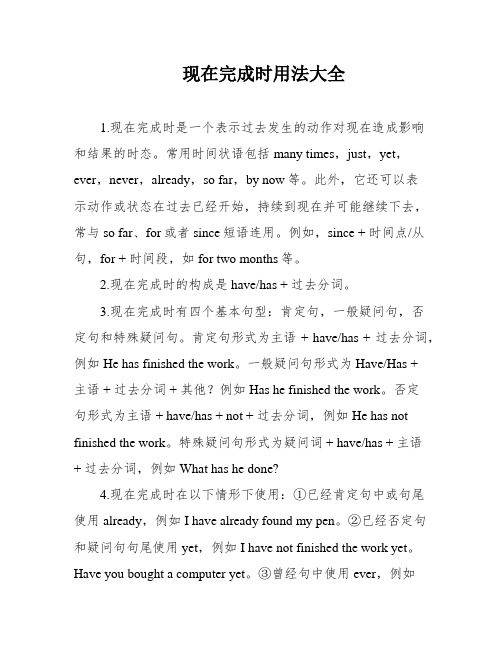
现在完成时用法大全1.现在完成时是一个表示过去发生的动作对现在造成影响和结果的时态。
常用时间状语包括many times,just,yet,ever,never,already,so far,by now等。
此外,它还可以表示动作或状态在过去已经开始,持续到现在并可能继续下去,常与so far、for或者since短语连用。
例如,since + 时间点/从句,for + 时间段,如for two months等。
2.现在完成时的构成是have/has + 过去分词。
3.现在完成时有四个基本句型:肯定句,一般疑问句,否定句和特殊疑问句。
肯定句形式为主语 + have/has + 过去分词,例如He has finished the work。
一般疑问句形式为Have/Has +主语 + 过去分词 + 其他?例如Has he finished the work。
否定句形式为主语 + have/has + not + 过去分词,例如He has not finished the work。
特殊疑问句形式为疑问词 + have/has + 主语+ 过去分词,例如What has he done?4.现在完成时在以下情形下使用:①已经肯定句中或句尾使用already,例如I have already found my pen。
②已经否定句和疑问句句尾使用yet,例如I have not finished the work yet。
Have you bought a computer yet。
③曾经句中使用ever,例如Have you ever seen pandas。
④从不句中使用never,例如I have never been to Beijing。
⑤刚刚句中使用just,例如I have just done my work。
⑥以前句尾使用before,例如I have never been there before。
八年级英语语法:现在完成时与一般过去时
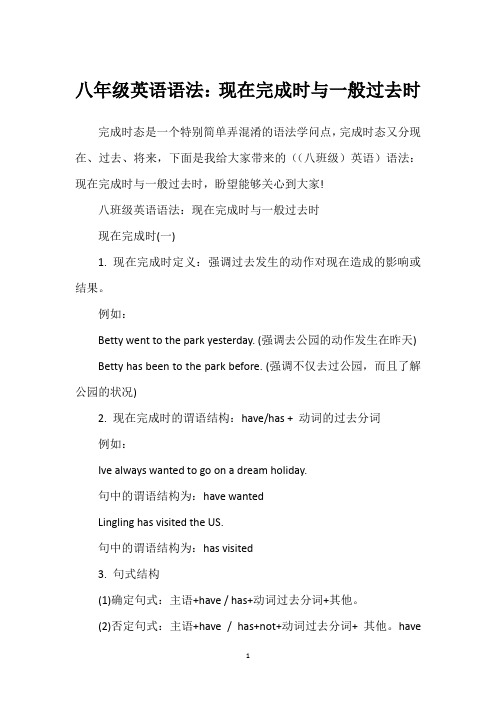
八年级英语语法:现在完成时与一般过去时完成时态是一个特别简单弄混淆的语法学问点,完成时态又分现在、过去、将来,下面是我给大家带来的((八班级)英语)语法:现在完成时与一般过去时,盼望能够关心到大家!八班级英语语法:现在完成时与一般过去时现在完成时(一)1. 现在完成时定义:强调过去发生的动作对现在造成的影响或结果。
例如:Betty went to the park yesterday. (强调去公园的动作发生在昨天) Betty has been to the park before. (强调不仅去过公园,而且了解公园的状况)2. 现在完成时的谓语结构:have/has + 动词的过去分词例如:Ive always wanted to go on a dream holiday.句中的谓语结构为:have wantedLingling has visited the US.句中的谓语结构为:has visited3. 句式结构(1)确定句式:主语+have / has+动词过去分词+其他。
(2)否定句式:主语+have / has+not+动词过去分词+ 其他。
havenot 和has not 分别缩写为havent和hasnt。
(3)一般疑问句式:Have / Has+主语+动词过去分词+其他? 确定答语为Yes, 主语+have / has.;否定答语为No, 主语+havent / hasnt.4. 过去分词的构成规章动词过去分词的构成规章与规章动词过去式的构成规章相同。
(1)动词一般在词尾加“-ed”。
如:workworkedworked(2)以“e”结尾的动词,词尾直接加“-d”。
如:livelivedlived(3)以“辅音字母+ y”结尾的动词,将“y”变为“i”,再加“-ed”。
如:crycriedcried(4)以重读闭音节结尾,末尾只有一个辅音字母,先双写该辅音字母,再加“-ed”。
现在完成时的四种用法
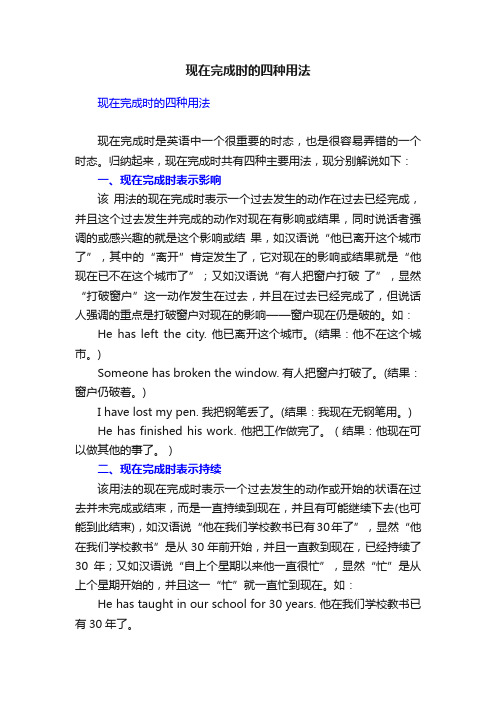
现在完成时的四种用法现在完成时的四种用法现在完成时是英语中一个很重要的时态,也是很容易弄错的一个时态。
归纳起来,现在完成时共有四种主要用法,现分别解说如下:一、现在完成时表示影响该用法的现在完成时表示一个过去发生的动作在过去已经完成,并且这个过去发生并完成的动作对现在有影响或结果,同时说话者强调的或感兴趣的就是这个影响或结果,如汉语说“他已离开这个城市了”,其中的“离开”肯定发生了,它对现在的影响或结果就是“他现在已不在这个城市了”;又如汉语说“有人把窗户打破了”,显然“打破窗户”这一动作发生在过去,并且在过去已经完成了,但说话人强调的重点是打破窗户对现在的影响——窗户现在仍是破的。
如:He has left the city. 他已离开这个城市。
(结果:他不在这个城市。
)Someone has broken the window. 有人把窗户打破了。
(结果:窗户仍破着。
)I have lost my pen. 我把钢笔丢了。
(结果:我现在无钢笔用。
)He has finished his work. 他把工作做完了。
(结果:他现在可以做其他的事了。
)二、现在完成时表示持续该用法的现在完成时表示一个过去发生的动作或开始的状语在过去并未完成或结束,而是一直持续到现在,并且有可能继续下去(也可能到此结束),如汉语说“他在我们学校教书已有30年了”,显然“他在我们学校教书”是从30年前开始,并且一直教到现在,已经持续了30年;又如汉语说“自上个星期以来他一直很忙”,显然“忙”是从上个星期开始的,并且这一“忙”就一直忙到现在。
如:He has taught in our school for 30 years. 他在我们学校教书已有30年了。
He has been busy since last week. 自上个星期以来他一直很忙。
He has worked for us ever since he left school. 他离开学校以后就一直为我们工作。
人教版英语八年级下册Unit8语法全解:现在完成时
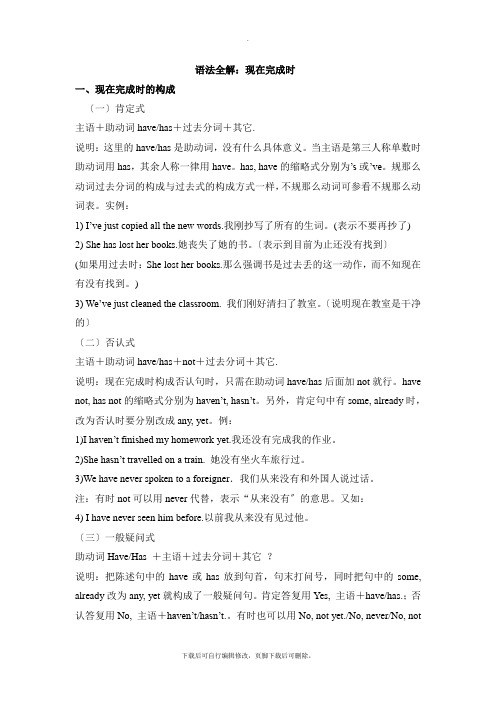
语法全解:现在完成时一、现在完成时的构成〔一〕肯定式主语+助动词have/has+过去分词+其它.说明:这里的have/has是助动词,没有什么具体意义。
当主语是第三人称单数时助动词用has,其余人称一律用have。
has, have的缩略式分别为’s或’ve。
规那么动词过去分词的构成与过去式的构成方式一样,不规那么动词可参看不规那么动词表。
实例:1) I’ve just copied all the new words.我刚抄写了所有的生词。
(表示不要再抄了)2) She has lost her books.她丧失了她的书。
〔表示到目前为止还没有找到〕(如果用过去时:She lost her books.那么强调书是过去丢的这一动作,而不知现在有没有找到。
)3) We’ve just cleaned the classroom. 我们刚好清扫了教室。
〔说明现在教室是干净的〕〔二〕否认式主语+助动词have/has+not+过去分词+其它.说明:现在完成时构成否认句时,只需在助动词have/has后面加not就行。
have not, has not的缩略式分别为haven’t, hasn’t。
另外,肯定句中有some, already时,改为否认时要分别改成any, yet。
例:1)I haven’t finished my homework yet.我还没有完成我的作业。
2)She hasn’t travelled on a train. 她没有坐火车旅行过。
3)We have never spoken to a foreigner.我们从来没有和外国人说过话。
注:有时not可以用never代替,表示“从来没有〞的意思。
又如:4) I have never seen him before.以前我从来没有见过他。
〔三〕一般疑问式助动词Have/Has +主语+过去分词+其它?说明:把陈述句中的have或has放到句首,句末打问号,同时把句中的some, already改为any, yet就构成了一般疑问句。
八年级下英语--现在完成时语法讲解
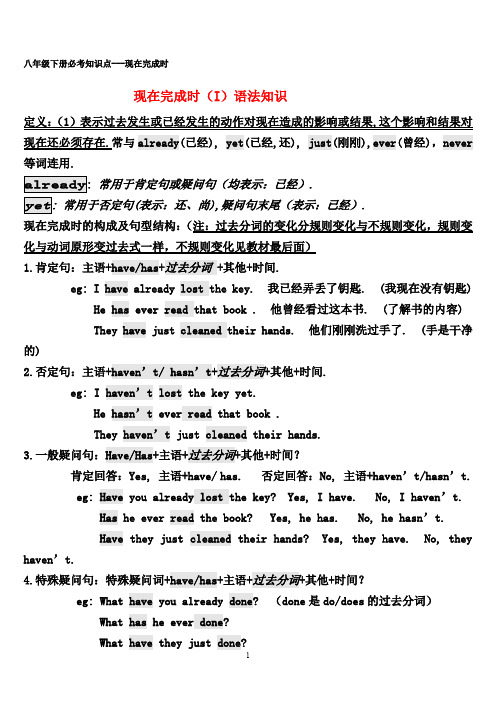
八年级下册必考知识点---现在完成时现在完成时(I)语法知识定义:(1)表示过去发生或已经发生的动作对现在造成的影响或结果,这个影响和结果对现在还必须存在.常与already(已经), yet(已经,还), just(刚刚),ever(曾经),never 等词连用.常用于肯定句或疑问句(均表示:已经).常用于否定句(表示:还、尚),疑问句末尾(表示:已经).现在完成时的构成及句型结构:(注:过去分词的变化分规则变化与不规则变化,规则变化与动词原形变过去式一样,不规则变化见教材最后面)1.肯定句:主语+have/has+过去分词+其他+时间.eg: I have already lost the key. 我已经弄丢了钥匙. (我现在没有钥匙) He has ever read that book . 他曾经看过这本书. (了解书的内容)They have just cleaned their hands. 他们刚刚洗过手了. (手是干净的)2.否定句:主语+haven’t/ hasn’t+过去分词+其他+时间.eg: I haven’t lost the key yet.He hasn’t ever read that book .They haven’t just cleaned their hands.3.一般疑问句:Have/Has+主语+过去分词+其他+时间?肯定回答:Yes, 主语+have/ has. 否定回答:No, 主语+haven’t/hasn’t. eg: Have you already lost the key? Yes, I have. No, I haven’t. Has he ever read the book? Yes, he has. No, he hasn’t.Have they just cleaned their hands? Yes, they have. No, they haven’t.4.特殊疑问句:特殊疑问词+have/has+主语+过去分词+其他+时间?eg: What have you already done? (done是do/does的过去分词)What has he ever done?What have they just done?定义:(2)现在完成时表示从过去开始一直持续到现在还有可能继续持续下去的动作或状态。
现在完成时讲解八年级英语
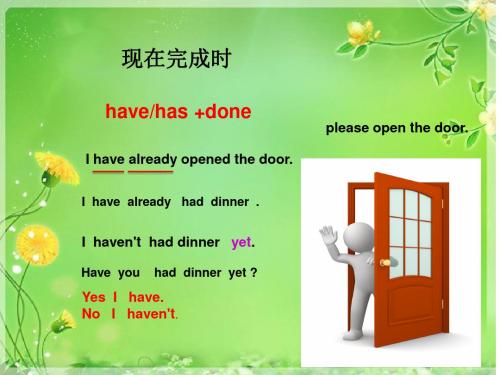
四、见过、听过的最......的
He is the fattest man I have ever seen. This is the most beautiful music I have ever heared.
五、从过去一直持续到现在的动作或状态 (for , since )
He has lived in beijing for 5 years.
你规我就规,你不规归我也不规
work-worked-worked eat- ate- eaten
过过Biblioteka 去去分式
词
现在完成时五大用法
一、已经完成的动作,强调对现在有影响。 I have already watered the flower. I have just washed the toilet。
二、还没有做或者从来没有做过的事
I haven't taken a shower yet. I have never been to shang hai .
三、做一件事做好几次
I have seen Titanic twice。 He has been to shang hai five times.
He has lived in beijing since 1981.
for since
have/has been to , have/has gone to
去过
去那了
have beenin (for,since)
She is not here. She_____________to the post office.
现在完成时
have/has +done
I have already opened the door.
初二英语语法现在完成时

初二英语语法现在完成时初二语法:现在完成时用法:(一)现在完成时表示过去发生或已完成的某一动作对现在造成的影响或结果。
与其连用的时间状语有:already ever just never yet recently例如:I have already opened the window. 我已把窗户打开。
She won’t go to the cinema tonight because she has already seen it.她今晚不去看电影,因为她已经看过了构成:1.肯定式构成:have/has+动词过去分词。
2.否定式构成:have/has+not+动词过去分词。
have/has与not 可分别缩写为haven’t, hasn’t 例如:Miss Hu hasn’t come back yet. 胡小姐还没回来。
3.疑问句的构成:将have/has提到主语前,简略答语用:Yes,主语+ have/has或No,主语+haven’t/hasn’t .例如Have you ever made cakes?Yes,I have. No,I haven’t.4.在现在完成时的各种结构中,have/has均为助动词,无实际意义。
当主语是第三人称单数时要用has。
have/has之后要用动词的过去分词,规则动词的过去分词与过去式的变化规则相同,如:finish—finished courage—couraged study—studiedstep—stepped clap—clapped skim——skimmed5.不规则动词的过去分词的变化基本可分为下列五种类型:1.) AAA (动词原形、过去式与过去分词同形)如:cut——cut——cut read——read——read2.) ABB(过去式过与去分词同形)如:buy ——bought——bought teach ——taught——taught3.)ABC(动词原形、过去式与过去分词各异) 如:drive ——drove—— driven grow——grew——grown4.)ABA(动词原形与过去分词同形) 如:come——came——come run——ran_——run5.)AAB(动词原形与过去式同形) 如:beat——beat——beaten用法:(二)现在完成时表示动作发生在过去并且一直持续到现在的动作或状态。
八年级上册英语期中考试知识点:现在完成时
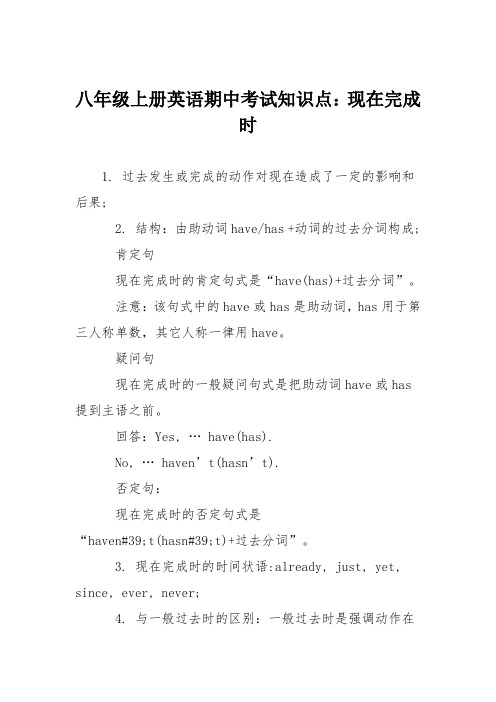
八年级上册英语期中考试知识点:现在完成时1. 过去发生或完成的动作对现在造成了一定的影响和后果;2. 结构:由助动词have/has +动词的过去分词构成;肯定句现在完成时的肯定句式是“have(has)+过去分词”。
注意:该句式中的have或has是助动词,has用于第三人称单数,其它人称一律用have。
疑问句现在完成时的一般疑问句式是把助动词have或has提到主语之前。
回答:Yes, … have(has).No, … haven’t(hasn’t).否定句:现在完成时的否定句式是“haven#39;t(hasn#39;t)+过去分词”。
3. 现在完成时的时间状语:already, just, yet, since, ever, never;4. 与一般过去时的区别:一般过去时是强调动作在过去发生,而现在完成时是强调过去发生的动作对现在造成了影响和后果。
5.一般过去时的时间状语:yesterday, justnow, …ago, last week, 2 years ago,in 1980等。
例:We planted (plant) some flowers in the garden last week.I have sent (send) the letter.He has come (come ) back home, he is watching (watch) TV now.David finished (finish) his homework just now.The monkeys are full, because we have fed (feed) them.A: I have lost (lose) my purse!B. Bad luck! When did you lose (lose) it?A: I lost (lose) it last night.与现在完成时连用的几个副词:already, just, ever, yet, never以上就是为大家整理的八年级上册英语期中考试知识点:现在完成时,怎么样,大家还满意吗?希望对大家的学习有所帮助,同时也祝大家学习进步,考试顺利!相关标签搜索:八年级期中复习。
